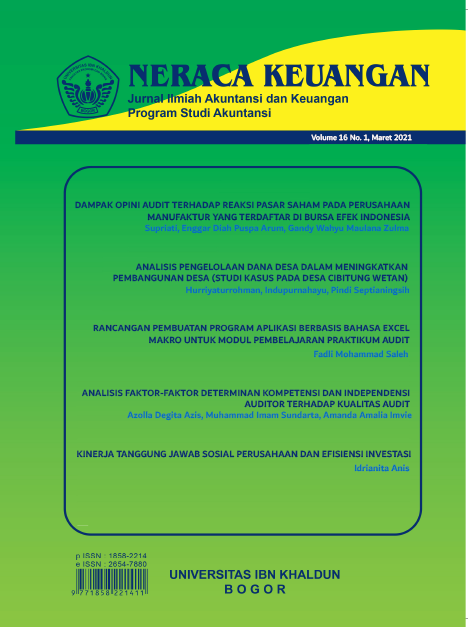KINERJA TANGGUNG JAWAB SOSIAL PERUSAHAAN DAN EFISIENSI INVESTASI
DOI:
https://doi.org/10.32832/neraca.v16i1.4613Abstrak
Beberapa tahun terakhir ini terlihat peningkatan pesat dalam tanggung jawab sosial perusahaan (CSR). Makalah ini membahas hubungan langsung dan tidak langsung antara kinerja CSR dan efisiensi investasi. Dengan menggunakan perusahaan manufaktur yang terdaftar di Bursa Efek Indonesia periode 2013-2017, pengambilan sampel dilakukan dengan metode purposive sampling dan dianalisis dengan regresi berganda. Hasil pertama menunjukkan bahwa perusahaan dengan kinerja CSR tinggi berinvestasi dengan lebih efisien. Analisis dilanjutkan dengan membedakan dua alternatif situasi: underinvestment dan overinvestment. Berfokus pada perusahaan yang kurang berinvestasi, kami menemukan bahwa kinerja CSR meningkatkan tingkat investasi perusahaan melalui pengurangan asimetri informasi. Sebaliknya, untuk perusahaan yang berinvestasi berlebihan, kinerja CSR mengurangi kelebihan investasi melalui mitigasi masalah arus kas bebas. Secara keseluruhan, temuan ini menunjukkan peran CSR secara tidak langsung memperbaiki efisiensi investasi tingkat perusahaan dengan mengatasi masalah keagenan serta masalah asimetri informasi.
Kata kunci: Tanggung Jawab Sosial Perusahaan, Efisiensi investasi, Biaya keagenan, Asimetri informasi.
Referensi
Agnes Cheng, C. S. and Reitenga, A. (2009), "Characteristics of institutional investors and discretionary accruals", International Journal of Accounting & Information Management, Vol.17, No.1, pp.5-26.
Aras, G., & Crowther, D. (2008). Governance and sustainability: An investigation into the relationship between corporate governance and corporate sustainability. Management Decision, 46(3), 433–448.
Ascioglu, A., Hegde, S. P. and McDermott, J. B. (2008), "Information asymmetry and investment–cash flow sensitivity", Journal of Banking & Finance, vol.32, No.6, pp.036-1048.
Attig, N., Boubakri, N., El Ghoul, S. and Guedhami, O. (2016), "Firm internationalization and corporate social responsibility", Journal of Business Ethics, Vol.134, No.2, pp.171-197.
Attig, N., Cleary, S. W., El Ghoul, S. and Guedhami, O. (2014), "Corporate Legitimacy and Investment–Cash Flow Sensitivity", Journal of Business Ethics, Vol.121, No.2, pp.297-314.
Attig, N., Cleary, S., El Ghoul, S. and Guedhami, O. (2012), "Institutional investment horizon and investment– cash flow sensitivity", Journal of Banking & Finance, Vol.36, No.4, pp.1164-1180.
Attig, N., El Ghoul, S., Guedhami, O. and Suh, J. (2013), "Corporate social responsibility and credit ratings", Journal of Business Ethics, Vol.117, No.4, pp.679-694.
Baron, R. M. and Kenny, D. A. (1986), "The moderator–mediator variable distinction in social psychological research: Conceptual, strategic, and statistical considerations", Journal of personality and social psychology, Vol.51, No.6, pp.1173.
Benlemlih, M., and Bitar, M. (2016), "Corporate Social Responsibility and Investment Efficiency", Journal of Business Ethics, pp.1-25.
Biddle, G. C., Hilary, G. and Verdi, R. S. (2009), "How does financial reporting quality relate to investment efficiency?, Journal ofAccounting and Economics, Vol.48, No.2–3, pp.112-131.
Borghesi, R., Houston, J. F. and Naranjo, A. (2014), "Corporate socially responsible investments: CEO altruism, reputation, and shareholder interests", Journal of Corporate Finance, Vol.26, pp.164–181.
Campello, M., Graham, J.R. and Harvey, C.R. (2010), "The real effects of financial constraints: evidence from a financial crisis", Journal of Financial Economics, Vol.97, No.3, pp.470–487.
Carroll, A. B. (1999) Corporate Social Responsibility: Evolution of a Definitional Construct. Business & Society. Vol.38. No.3. September 1999.
Chen, R., El Ghoul, S., Guedhami, O. and Wang, H. (2014), "Do state and foreign ownership affect investment efficiency? Evidence from privatizations", Journal of Corporate Finance.
Cheng, B., Ioannou, I. and Serafeim, G. (2014), "Corporate social responsibility and access to finance", Strategic Management Journal, Vol.35, No.1, pp.1-23.
Chi, J. D. and Lee, D. S. (2010), "The conditional nature of the value of corporate governance", Journal of Banking & Finance, Vol.34, No.2, pp.350-361.
Cho, S. Y., Lee, C. and Pfeiffer, J.Pr.Jr. (2013), "Corporate social responsibility performance and nformation asymmetry", Journal of Accounting and Public Policy, Vol.32, No.1, pp.71-83.
Chowdhury, J., Kumar, R. and Shome, D. (2016), "Investment–cash flow sensitivity under changing information asymmetry",
Journal of Banking & Finance, Vol.62, pp. 28-40. Cui, J., Jo, H. and Na, H. (2015), "Does Corporate Social Responsibility Affect Information Asymmetry? ", Journal of Business Ethics, pp.1-24
Dhaliwal, D., Li, O.Z., Tsang, A.H. and Yang, Y.G. (2011), "Voluntary non-financial disclosure and the cost of equity capital: The case of corporate social responsibility reporting", The Accounting Review, Vol.86, No.1, pp.59-100.
Eccles, R., Ioannou, I. and Serafeim, G. (2012), "The impact of corporate sustainability on organizational processes and performance", Working paper, Harvard Business School, Harvard University, Boston, MA
El Ghoul, S., Guedhami, O. and Kim, Y. (2016a), "Country-level institutions, firm value, and the role of corporate social responsibility initiatives", Journal of International Business Studies.
El Ghoul, S., Guedhami, O., Kim, H. and Park, K. (2014), "Corporate environmental responsibility and the cost of capital: International evidence", Journal of Business Ethics, pp.1-27.
El Ghoul, S., Guedhami, O., Kwok, C.C.Y. and Mishra, D.R. (2011), "Does corporate social responsibility affect the cost of capital? ", Journal of Banking and Finance, vol.35, No.9, pp.2388-2406.
El Ghoul, S., Guedhami, O., Nash, R., and Patel, A. (2016b), "New evidence on the role of the media in corporate social responsibility", Journal of Business Ethics, pp.1-29.
Fauzi, (2014). Indonesian Executives Perspective of CSR Practices. Issues in Social and Environmental Accounting. ISSN 1978-0591. Vol. 8, No. 3. 2014. Pp 171-181.
Fauzi, H., L.Mahoney dan A.A.Rahman (2007) Institutional Ownership and Corporate Social Performance: Empirical Evidence from Indonesian Companies. Issues in Social and Environmental Accounting. Vol.1, No.2 December 2007.
Fauzi, Hasan (2009) Redefining CSR concept in Indonesia. The Jakarta Post (Augus, 5, 2009)
Guariglia, A. and Yang, J. (2016), "A balancing act: managing financial constraints and agency costs to minimize investment inefficiency in the Chinese market", Journal of Corporate Finance, Vol.36, pp.111-130.
Gunawan, Juniati, (2016) Corporate Social Responsibility Initiatives in a Regulated and Emerging Countries : An Indonesia Perspective. Springer International Publishing Switzerland 2016. S.O. Idowu (ed.), Key Initiatives in Corporate Social Responsibility, CSR, Sustainability, Ethics & Governance
Harjoto, M. A. and Jo, H. (2011), "Corporate governance and CSR nexus". Journal of Business Ethics, Vol.100, No.1, pp.45–67.
Hayashi, F. (1982), "Tobin's marginal q and average q: A neoclassical interpretation", Econometrica, Vol.50, No.1, pp.213-224.
Hubbard, R. G. (1998), "Capital-market imperfections and investment", Journal of Economic Literature, Vol.36, No.1, pp.193–225.
Jensen M., Meckling W.H. (1976), "Theory of the firm: managerial behaviour, agency costs and ownership structure", Journal of Financial Economics, vol.3, pp.305–360.
Jensen, M. (1986), "Agency costs of free cash flow, corporate finance and takeovers", American Economic Review Papers and Proceedings, Vol.76, No.2, pp.323–329
Jensen, M. (2001), "Value Maximization, Stakeholder Theory, and the Corporate Objective Function", Journalof Applied Corporate Finance, Vol.14, No.3, pp.8-21.
Porter, M.E. and Kramer, M.R. 2002. ‘The competitive advantage of corporate philanthropy. Harvard Business Review, 80:12, 56–68.
Samet, M., dan A. Jarboui. (2017) How does corporate social responsibility contribute to investment efficiency Wartick, S. L., & Cochran, P. L. (1985). The evolution of the corporate social performance model. Academy of Management Review, 10, 758-769.





















